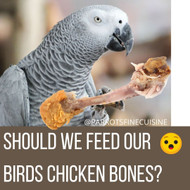Should we feed our birds chicken bones?
Posted by Karmen Budai on 21st May 2021
Should we really be feeding bones to our birds? It always makes me wonder where this trend has started as so many parrot owners are seriously convinced the bone marrow is extremely healthy for their birds, hence should be part of their diet. I feel like each time I try to point out the health risks that comes with it, I'm losing a battle right at the start as people already made their mind up and don’t want to hear anything else. It would never even occur to me that someone would consider feeding bones to psittacine birds.
So, I decided to ask about this an avian specialist Dr Stephanie Lamb, DVM to finally bring some light to this ever-controversial subject and explain why feeding chicken bones could affect your bird's health in a long run and is not a suitable food choice for your birds.
But first thing first, just to clarify one more thing - parrots are granivores and frugivores and not omnivores as Mr google says. Yet another misinformation out there.
Here is what Dr Lamb, DVM, DABVP says:
Looking at bone marrow as a part of the diet comes down to the difference between nutrients and ingredients. Nutrients are the individual components of the diet- fats, proteins, minerals, etc. Ingredients are the whole food items in the diet- seeds, beans, etc. One could look at marrow and compare its nutrients to that of other foods and you will find that on a nutrient basis its similar to some other options. However, looking at what we have discovered in other species we really are learning that it's not just about the nutrients in the diet but it's also about the ingredients. In recent years medical problems have arose in other companion animals due to people thinking about just nutrients and not ingredients (i.e. heart disease in dogs and bladder stones in ferrets). As we have found in other species, there are other things in diets aside from just the nutrients we think about that can have effects on the body and alter the way nutrients are available to an animal. We don't completely understand how something like bone marrow could affect or interact with other nutrients in a parrot's body. Feeding bone marrow a few times a month can be detrimental to the bird's health over time.
Although thinking about wild parrots needs and directly correlating it to our pet birds' requirements needs to be understood that it has its limitations, it is something to consider evaluating when looking to feeding our pet birds. One must ask themselves; would a wild bird eat bone marrow a few times a month? The answer is no. They would likely never consume bone marrow. One could argue that they may opportunistically find something as they are foraging and munch on it yes, but it's not going to be a routine thing at all. Additionally, we have evidence to support that diets high in linoleic acid as opposed to alpha-linolenic acid caused African grey parrots to have more atherosclerotic lesions. Atherosclerosis is a vascular disorder where plaques develop in the vessels, leading to poor blood flow in the body. Bone marrow is high in linoleic acid. Evidence supports that alpha-linolenic acid is better for parrots for their health and reduces the cardiovascular disease atherosclerosis that is sadly seen more and more in our aging pet birds.
Therefore, in conclusion data supports that other fat sources are better for cardiovascular health, we know that parrots do not routinely eat marrow in the wild, and in other species we are learning more than nutrients and ingredients both are important to take into consideration when formulating diets.

